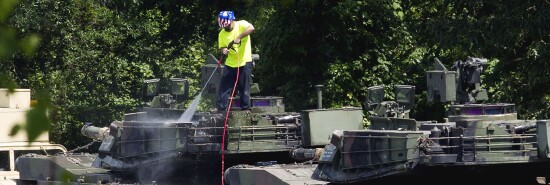
The Taiwan trade-off debate is key, but Biden is right to send these weapons to Ukraine
Tom Rogan
Video Embed
President Joe Biden is right to send tanks, depleted uranium shells, cluster munitions, and F-16 fighter jets to Ukraine. Abrams tanks can help Ukraine’s counter-offensive breach Russian defenses. Cluster munitions are helping Ukraine limit Russian maneuver potential.
Rightly limited to use in Ukraine, F-16s will help Ukraine degrade Russian air cover and command and control apparatus.
NYC PUBLIC SCHOOLS INUNDATED WITH IMMIGRANT STUDENTS ON FIRST DAY: ‘ANGRY AND CONCERNED’
Top line: These weapons should go to Ukraine because they are not needed elsewhere, and the United States has a significant interest in Ukraine defeating Vladimir Putin‘s invasion — put another way, enabling Ukraine to reach an enforceable and Kyiv-favorable peace accord with Moscow. While the Biden administration has failed to articulate its objectives in Ukraine, it is of significant U.S. strategic interest that Ukraine win.
Russia cannot be allowed to destroy European peace and security at the altar of Putin’s imperial dreaming.
That would encourage Putin’s further expansion against America’s best allies in Europe, such as Estonia and Poland. Russian victory would also implode America’s strategic credibility in Europe. As the U.S. wages a multi-generational Cold War against China, it must show its European allies that they have reason to align with the U.S. over China. This is no small concern in light of the existing Beijing flirtations of top European leaders such as Emmanuel Macron, Olaf Scholz, and even the U.K.’s Rishi Sunak.
I recognize, however, that this is not the collective view.
In contrast with some Heritage scholars but in tune with a rising number of Republican primary voters, for example, Heritage Foundation President Kevin Roberts now argues that “the case for supporting Ukraine is weaker than ever.” He suggests that Ukraine is “escalating the conflict” by striking inside Russia. Roberts argues that his stance better fits with Ronald Reagan’s foreign policy example.
I disagree. Roberts and the Biden administration might prefer that Ukraine allow its apartment buildings and markets to get smashed by Russian missiles without rebuke, but I doubt Reagan would have felt the same way. Instead, I believe he would have recognized that this war is escalating not because of Ukrainian drones in Russia but rather because Putin is struggling on the Ukraine battlefield and, by extension, in his domestic credibility. Would Reagan have been cowed by Russia’s petulant dangling of nuclear threats? I think not.
What matters in terms of uncontrolled escalation is that Ukraine does not use U.S. weapons inside Russia nor support a ground offensive into Crimea. Yet, we shouldn’t forget how Reagan supported the Afghan resistance to the Soviets. That support drained the decrepit Soviet Union of power, speeding its systemic decline. It helped win the Cold War. Side note: The subsequent rise of the Taliban and al Qaeda was a failure of ensuing U.S. policy, not a direct consequence of U.S. support for the resistance (the U.S. should have provided more and earlier support to the anti-Taliban commander and more moderate Ahmad Shah Massoud).
That said, even if the moral and strategic interest in supporting Ukraine is compelling, other U.S. strategic interests mean Washington cannot simply provide Ukraine with whatever it wants. The U.S. needs to retain some weapons for possible use by Taiwan against any Chinese invasion. Xi Jinping views his conquest of Taiwan as a matter of destiny. He has ordered his People’s Liberation Army to be ready to conduct such a conquest by the year 2030. And while Taiwan is unserious about its own defense, its collapse to China would be disastrous for the U.S.
The debate over what weapons not to send to Ukraine in order to keep them in reserve for Taiwan is thus a critical one.
The Heritage Foundation’s Alex Velez-Green recently elucidated this concern. I don’t agree with Velez-Green on all the weapons systems he argues must go to Taiwan over Ukraine, but his top-line point is well made: Trade-offs must be given ruthless consideration.
An instructive example here comes with the debate over sending long-range ATACMS missiles to Ukraine. Many analysts have argued that Biden should send ATACMS to Ukraine. Certainly, that weapon would bolster Ukraine’s ability to destroy Russian command centers at range.
That would be a very good thing. The problem? The U.S. only has a very small stockpile of ATACMS, and the missile would also provide outsize value for Taiwan’s resistance to a Chinese invasion. It would, for example, allow Taiwanese rocket forces to target PLA command posts from concealment at long range and, hopefully, under some measure of air cover. It would offer Taiwan the prospect of degrading PLA beachheads and conducting counter-offensives. Unfortunately, ATACMS don’t grow on trees.
As with many other weapons systems of use to both Taiwan and Ukraine, the U.S. industrial capacity for munitions is woeful.
CLICK HERE TO READ MORE FROM THE WASHINGTON EXAMINER
Velez-Green emphasizes another point that gets far too little play in Washington. Namely, the U.S. should more heavily pressure its European allies to provide far greater support for the alliance, particularly Ukraine. While some NATO members, such as Britain, Poland, and the Baltic states, provide significant support in this regard, the commitments of others, such as Belgium, France, and Germany, are sorely lacking. For just one example, the U.S. continues to provide the vast majority of air-to-air refueling aircraft in Europe. These are sparse capabilities that would be of critical value in any war over Taiwan.
Ultimately, then, the U.S. can and should support Ukraine, but with the recognition that America’s strategic interests extend beyond Ukraine and, thus, that hard choices will sometimes be needed.
